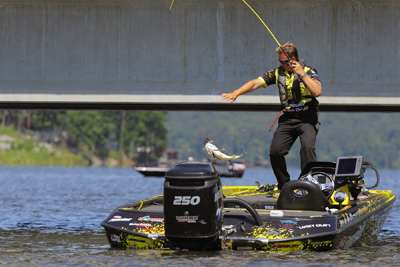
With the air temperature soaring above the 100-degree mark and the water temperature in the upper 80s, conditions seemed ideal for Skeet Reese to catch bass either deep cranking or on a 10-inch Berkley Power Worm during this year’s Elite Series event on Fort Gibson Lake. However, during practice Reese never got a bite deep cranking and only managed a few bites probing the worm 15 to 20 feet deep.
So, Reese started pitching the magnum worm to the shallows, but he eventually keyed on rocks with a football jig to trigger bites. By keeping an open mind and being versatile, the California pro eventually dialed in a pattern of cranking a Lucky Craft RC 2.5 crankbait in the shallow rocks that produced 70.15 pounds and a second-place finish.
The versatility he displayed in this event exemplifies why Reese is consistently one of the top Elite Series pros. “The versatile angler will be consistently there, but the specialist will win more,” admits Reese, who knows specialists are hard to beat when their bite is on, but are just donating money at other times.
“I believe you can be great at all techniques, so why not be great at all of them, then, no matter what the conditions, you have an opportunity to win.” So how does a weekend angler learn to become more versatile? “It’s about fishing more than one or two lakes,” says Reese. “Most people get sucked into fishing one or two lakes around home. The more types of fisheries you go to, the more you are going to learn.” The six-time BASS winner believes his formative years of bass fishing in California helped develop his versatility. “I grew up in one of the most diverse fishery areas in the country.
Within a couple of hours of the house I could be at the California Delta (a tidal river system), or Clear Lake (a shallow, natural lake) or Lake Don Pedro (a clear man-made reservoir) or on Shasta or Oroville (spotted bass fisheries and deep, clear-water lakes).” If you want to become a more versatile angler, heed these tips from Reese.
- Invest plenty of time in learning a new technique or lure and keep an open mind
“It’s a matter of spending time on the water doing each technique. I hear so many guys around the country saying they hate spinning rods because it’s not power fishing. - If you’re one of those guys, most of the time you’re going to get your rear handed to you on a silver platter because you can’t always catch them power fishing.”
- Study seasonal patterns and apply a new technique during its prime time
Until you get the right conditions and you learn to fish the technique right, you might not get the bites. Most techniques have a special window when they’re going to be productive. - You can go out there and practice ledge fishing with a crankbait in the springtime all you want but it’s probably not the smartest thing to do because all the fish are going to be up on the bank.”
- If all else fails, try a new technique during the thick of competition
“I’ve done a lot of prefishing with new techniques during tournaments, so I really can’t say a tournament is a bad time to do it. There’s never a bad time to learn. - You just have to know when to try something else when what you’re doing isn’t working.”
- Clear the other rods from your deck
“If you don’t feel comfortable fishing a crankbait on a ledge, but you want to learn the technique, just take a couple of crankbait rods with you and force yourself to learn it. Learn how to use your electronics and your crankbaits together. That’s how you get a better understanding.”
Editor’s Note: If you have a story idea you would like to vote on for an upcoming poll, send your idea to john@jnoutdoors.com.





